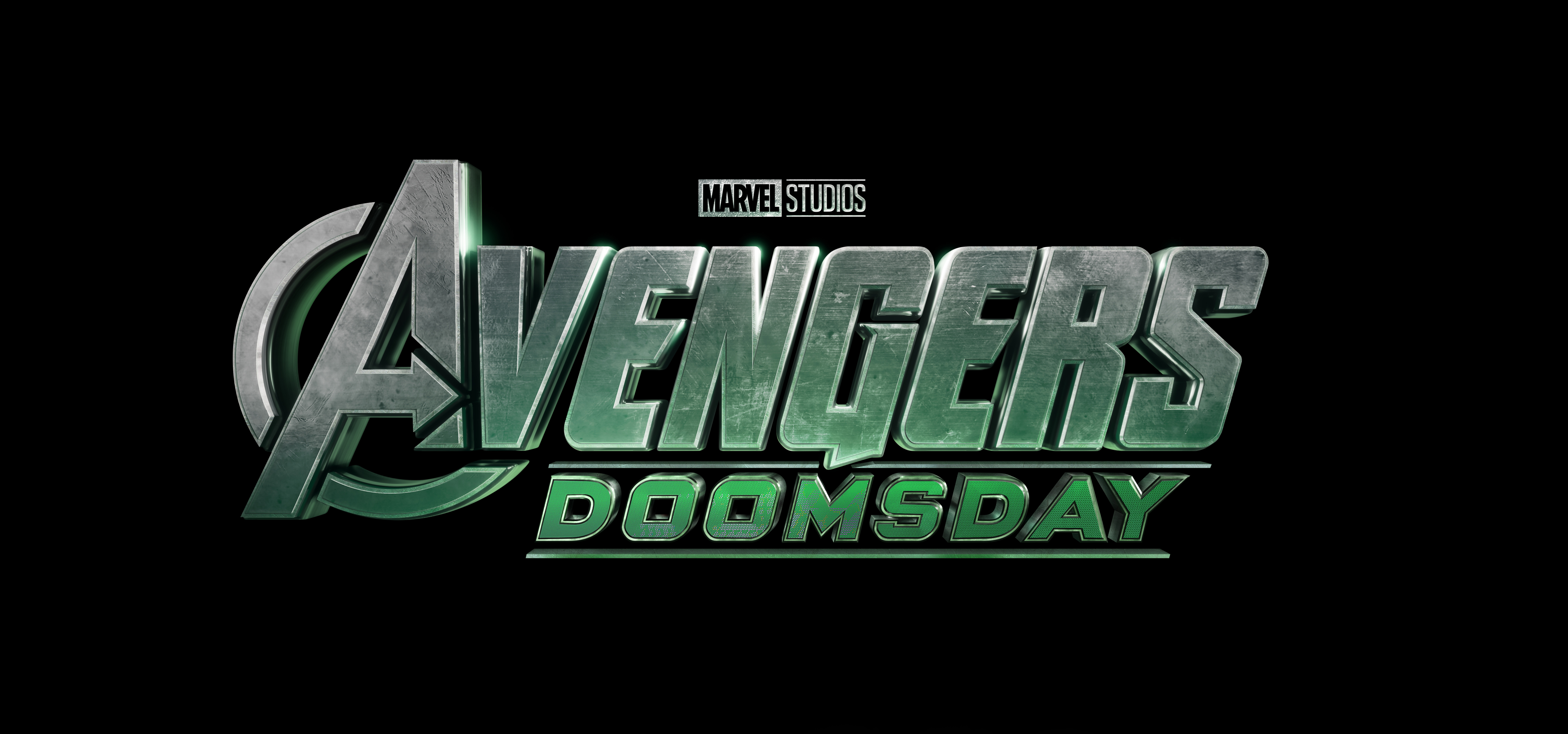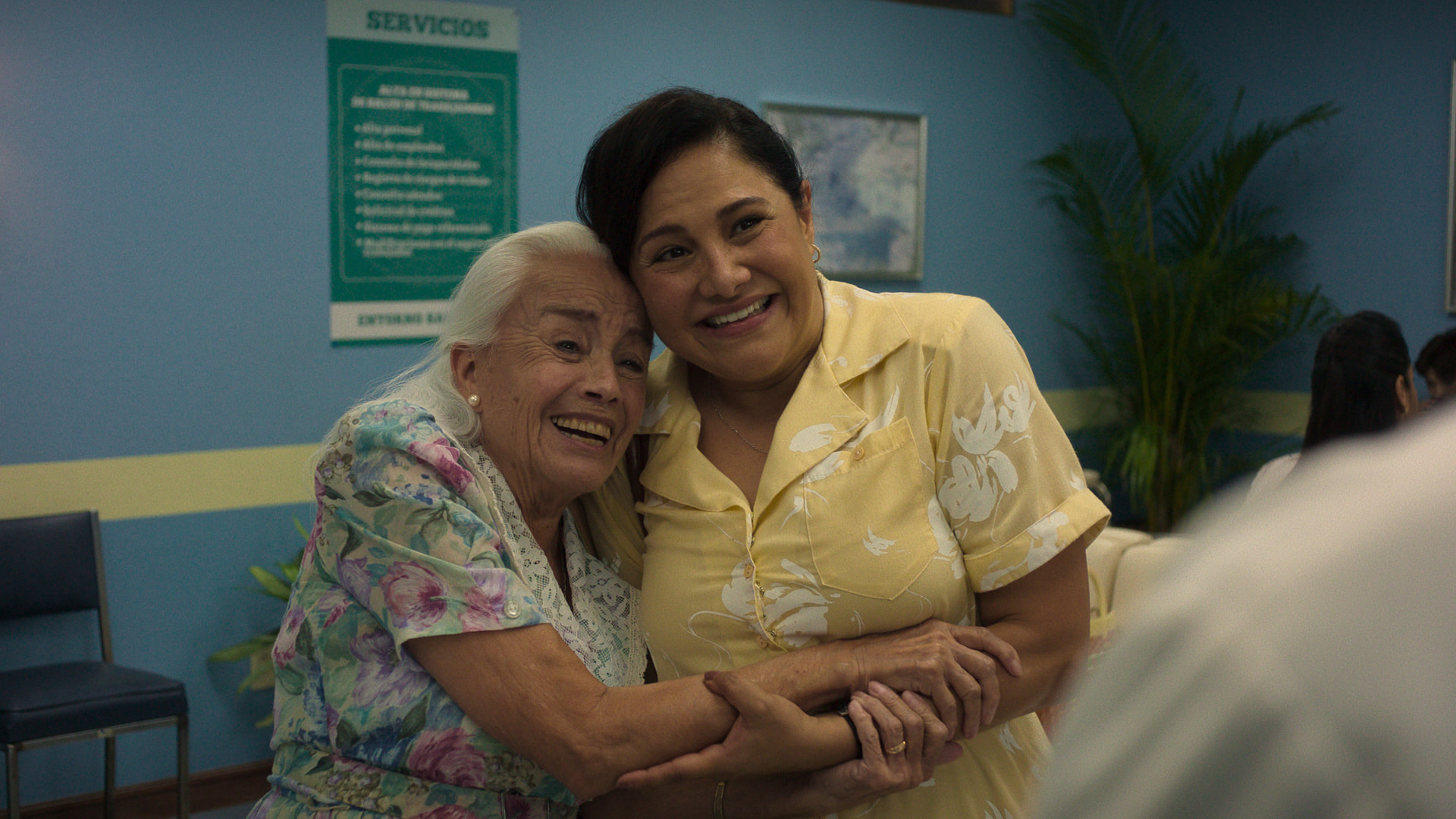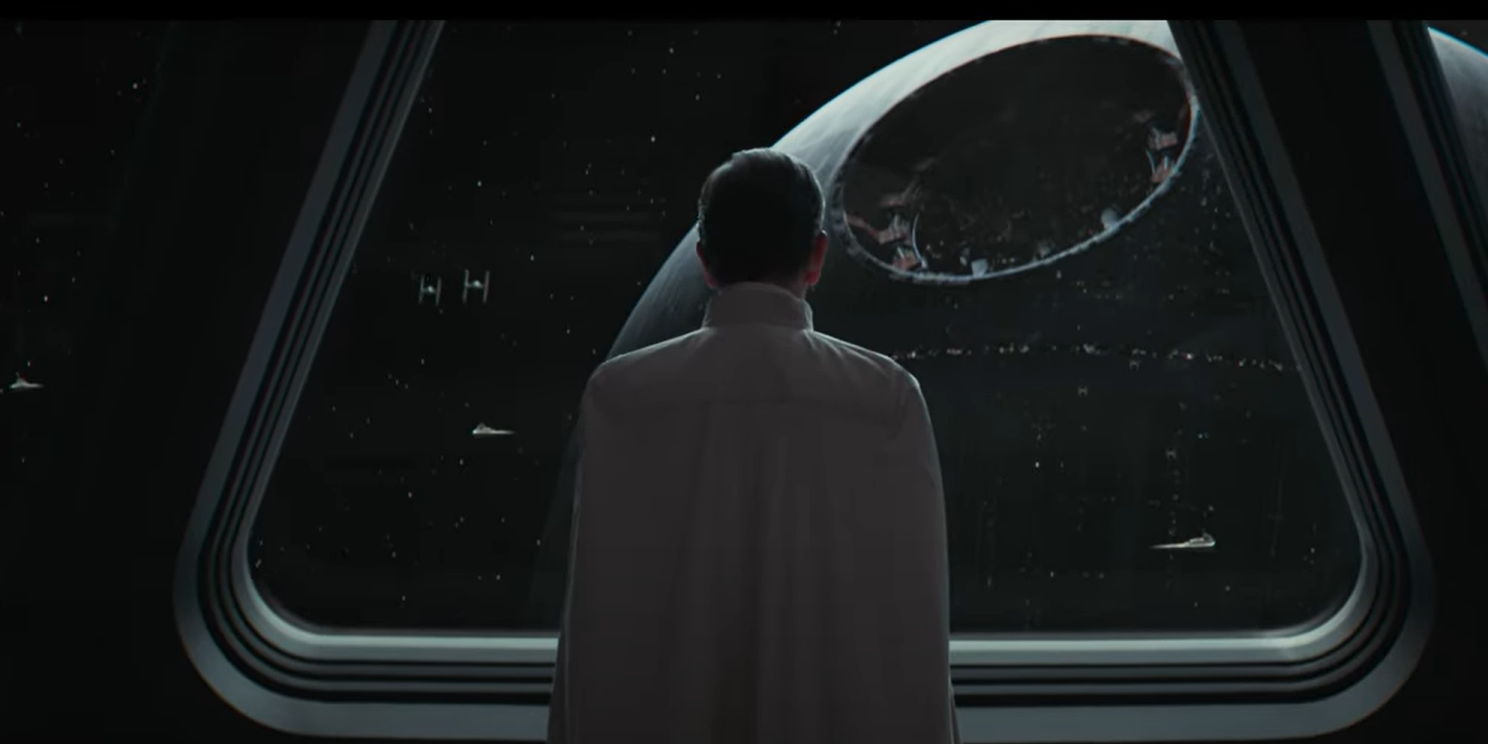![]()
Actress Elizabeth Reaser might not be the most well known name in the world of movies, mainly because she’s been doing smaller indies before being cast as Esme Cullen in The Twilight Saga, but it’s hard to miss if you’re an avid television viewer. In the past ten years, she’s had recurring roles on Grey’s Anatomy and The Good Wife, plus appeared on True Detective and Mad Men.
She holds a very prominent role in Mike Flanagan’s Ouija: Origin of Evil, the prequel to the 2014 horror hit, playing Alice Zander, the widowed mother of two girls, who holds séances in their home to make money. When she discovers the hot new trend, the Ouija board—this is 1965 Los Angeles, after all—she hopes to bring it into the act, but instead calls forth malevolent spirits that possess her younger daughter Doris (Lulu Wilson). Things get worse from there.
Surprisingly, it’s Reaser’s very first horror film, and as we’ve seen in other recent horror films like The Conjuring and Lights Out, having a strong dramatic actor in the movie gives it a lot more weight than these movies normally might have.
LRM spoke with Reaser on the phone a few weeks back.
LRM: I’m familiar with your work in indie movies, as well as in “Twilight,†but I don’t think you’ve ever done a horror film that I know about.
Elizabeth Reaser: No, I’ve never done one.
LRM: So it was interesting see you in this movie as a mother with two girls, so how did this come your way?
Reaser: You know, I think Mike Flanagan wrote this incredible script, and I got it sent to me—I think he had seen Sweetlands years ago—and it got sent to me and I was reading it, and when you “horror movie,†you think, “Oh, it’s going to be crappy.†Then I read it, and I thought, “This is a real story and these characters are so interesting,†and when do you ever see a big movie about a single mother with daughters who is a psychic and a widow and all these elements and just how incredibly vulnerable she was. I found it to be really interesting, and then I watched Oculus, and I basically had to turn it off, because it was so scary. I was like, “Oh, this guy knows what he’s doing.â€
LRM: I spoke to Mike a few minutes ago and I think he mentioned that you’re not really a horror movie fan at all, so that’s interesting that someone who doesn’t watch horror movies would be a part of one.
Reaser: (giggles) Well, yeah, to me, it was all about the story, about the character. My character doesn’t know she’s in a horror movie, so I didn’t treat it as that. I didn’t even think of it as a horror movie while I was doing it. I thought it was someone who is experiencing intense grief, and how it’s made her vulnerable to these forces that are taking over her family. I thought that was really interesting. It reminded me of the really great horror movies like The Exorcist or The Shining, some of these psychological movies that are obviously some of the great movies of all time. The idea of getting to be in a great horror movie was pretty exciting.
LRM: I’m a big horror fan myself so I watch a lot of them, and there’s interesting Renaissance because in the last few years, we’ve seen movies like “The Conjuring†with A-level dramatic actors doing them, which gives them another level, which I think is the case with this as well.
Reaser: Well, thank you so much for saying that. I think it makes a huge difference, because the most important thing in a horror movie, I think, at least for me, one of the reasons why I’m not drawn to them is they don’t feel real. The thing that Mike Flanagan, or you, talk about The Conjuring with Patrick and Vera Farmiga. I think when you put actors like that in a horror movie, it gets the audience to believe in that world, and it draws you into the story. That makes it possible to really scare people in a different way, as opposed to B.S. sort of scares. That kind of stuff doesn’t really affect me. I want it to be psychological.
![]()
LRM: It’s also interesting that the movie is set in the ‘60s. I know neither of the actresses playing your daughters were alive back then. I’m not sure Mike was alive and I doubt you were either, so what is it like getting into that head of doing a ‘60s period movie?
Reaser: I had done Mad Men the year before, so I had done a lot of research on that time period, and I’m always really interested in the late ‘60s. That, to me, is just such a fun world both visually and historically, what was going on in our country at the time. So I think it takes the viewer somewhere different, and they also shot it with such visual style, these really compelling, cinematic ways of shooting and telling the story that elevates what we were doing.
LRM: What about the two actors playing your daughters? Lulu was amazing but your older daughter, Annalise, I saw her in “Captain Fantastic†and she was great in that, but for Lulu, was this her first movie or close to it?
Reaser: Well, you would think because she’s so young, right? But she’s done some other things. She’s been working for a little while, but she’s incredible. I mean both of these girls… the minute I met Lulu, I knew that I could not talk to her like she was a kid. I knew that she wasn’t really a kid, that she was a real actress, so we just started playing scenes and sort of discussing what was happening. It was never like talking to a child. She’s sort of unsettling in that way, because she’s so intelligent and mature and savvy. She just knows what she’s doing. Obviously, it’s instinctual, but it was incredible to watch that play out. Then with Annalise, you watch Annalise and it feels like you’re not watching an actor, it’s like she’s so natural that it’s heartbreaking to watch her. To play scenes with her sometimes, I just adore them, I love them. I’ve worked with a lot of kids, and they’re definitely my favorite kids I’ve ever worked with. I genuinely love being around them and think they’re really great people.
LRM: I know you started fairly young. Do you find working with kids is different because they’re not as trained and they’re more natural?
Reaser: They usually are less trained and that can be really cool and fun to see what they come up with. They’re still in the phase, hopefully, where it’s fun. With kids, it’s pretend, it’s make-believe and they can really commit in a way that sometimes adults can’t. Lulu knew exactly what she was doing with that character. She knew exactly from the first table read. I think she was just having a blast.
LRM: I think Mike mentioned that her soliloquy about being strangled was part of her audition and did it the same way in one take on camera. That’s amazing that someone that young can do that.
Reaser: Also, it’s so bone-chilling, that monologue, but how does she even know what that is… she’s gifted. She knows what that is, she knows what’s scary about it. I remember at the table read, she had it completely memorized, and everyone in the room was like, “Okay… we better get on it here.â€
I love that about working with kids, certainly these two actresses. I could really just listen to them and watch them. They’re fascinating, and they’re real. They’re not like child actors. They’re young, but they’re not overly smoothed out. They’re real. They’re bringing something that’s unusual and special every take. I think it was really fun for Henry (Thomas) and I to get to experience that.
![]()
LRM: Have you worked with a lot of kids? I feel this is the first time I thought of you playing a mother character?
Reaser: I feel like I’m always playing a mother. From a very young age, I’ve played mothers. I don’t think I just have a mother face, I don’t know why.
LRM: I don’t know if you had any expectations about doing a horror movie, but what was your experience like compared to those expectations?
Reaser: I think what surprised me about shooting this movie mostly was that I never felt like I was shooting a horror movie. Except for when things got really out of hand, the focus that Mike Flanagan was always drilling down on the truth and the emotional… he always wanted to go further, deeper, more raw, more vulnerable. For me, that’s an actor’s dream, so it really felt like I get to play the most intense things a human can ever experience, and to me, that was the challenge and the fun of it all.
LRM: Another recent surprise is that someone told me about Joe Swanberg’s Netflix show and I’ve been a fan of his for some time, but I hadn’t heard of it, and I watched the first episode and there you were.
Reaser: I loved it. I mean, he’s brilliant. I loved working with him, it’s just so fun. It’s all improvised, it was so much fun.
LRM: Was that the most improv you’ve done on anything before?
Reaser: Oh, yes. I’ve never gotten to do anything where I improvised and that entire thing… he had an outline, he knew what the story was, but every single word, movement, was improvised. Never knew what was going to happen, it was just so exciting and crazy!
LRM: That was a great story and you had a great co-star, but a lot of the other characters would pop up in different episodes. Do you know if he has a plan to have you come back and do more as your character?
Reaser: I think if we did a second season, but I don’t know if we have one yet. I haven’t heard anything about it. I know I would love to do it again or work with him, obviously. He’s wonderful.
LRM: There was this period where I was seeing you in a lot of movies and then you did the “Twilight†movies, but I don’t remember seeing you much after that. Did you take a break for a couple of years?
Reaser: No, I think after Twilight, I had done that for so many years. I wanted to really make sure I was doing some acting stuff, so I did a lot of plays in New York. In the last two years, I’ve done a lot of plays. For me, I did How I Learned to Drive, I did Neil Labute’s play. I did a lot of plays, so I’m actually getting ready to do another one. Yeah, I just needed to make sure that I was still acting.
LRM: I would never knock doing plays in New York, because I go to them when I can afford them.
Reaser: No, I know. I just mean that Twilight wasn’t really a huge acting challenge, so I needed to make sure that I was still working it out with the acting muscles.
Ouija: Origin of Evil is now playing nationwide. You can check out our interview with director Mike Flanagan here.

 FOR FANBOYS, BY FANBOYS
Have you checked out LRM Online’s official podcasts and videos on The Genreverse Podcast Network? Available on YouTube and all your favorite podcast apps, This multimedia empire includes The Daily CoG, Breaking Geek Radio: The Podcast, GeekScholars Movie News, Anime-Versal Review Podcast, and our Star Wars dedicated podcast The Cantina. Check it out by listening on all your favorite podcast apps, or watching on YouTube!
Subscribe on: Apple Podcasts | Spotify | SoundCloud | Stitcher | Google Play
FOR FANBOYS, BY FANBOYS
Have you checked out LRM Online’s official podcasts and videos on The Genreverse Podcast Network? Available on YouTube and all your favorite podcast apps, This multimedia empire includes The Daily CoG, Breaking Geek Radio: The Podcast, GeekScholars Movie News, Anime-Versal Review Podcast, and our Star Wars dedicated podcast The Cantina. Check it out by listening on all your favorite podcast apps, or watching on YouTube!
Subscribe on: Apple Podcasts | Spotify | SoundCloud | Stitcher | Google Play



